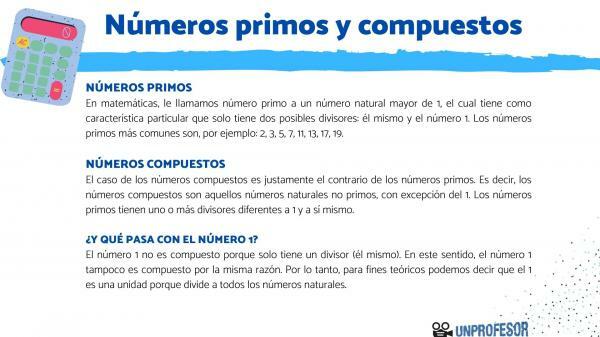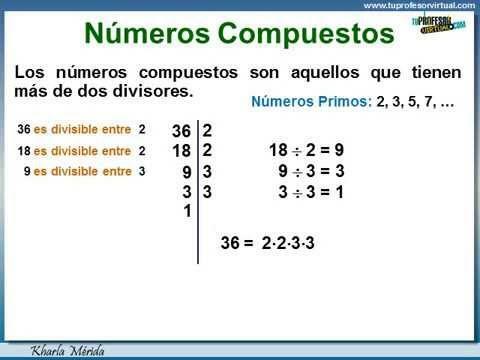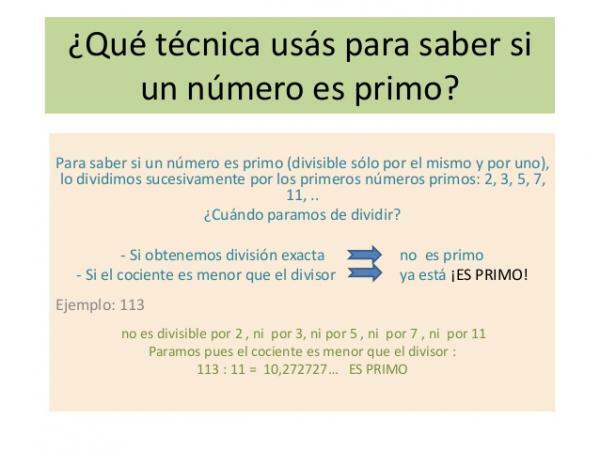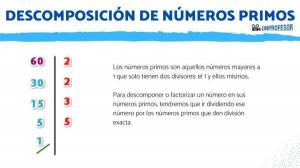Prime and composite numbers

You want to know what are prime and composite numbers? In this lesson from a TEACHER we will reveal the definition of these math concepts, with examples and exercises with solutions so that you can test your knowledge. A simple and very practical class that will help you to better understand this type of number so essential in science.
Index
- Definition of prime numbers
- Definition of composite numbers
- And what about 1?
- How to know if a number is prime
- Prime and composite number exercises
- Solution practical exercises
Definition of prime numbers.
In math, we call it prime number to a natural number greater than 1, which has as a particular characteristic that it only has two possible divisors: itself and the number 1.
The most common prime numbers are, for example: 2, 3, 5, 7, 11, 13, 17, 19. However, as Euclid indicates in his theorem, like numbers, primes are equally infinite. We will expand on this information later with practical examples.

Image: Slideshare
Definition of composite numbers.
The case of composite numbers is just the opposite of prime numbers. That is, the composite numbers are those non-prime natural numbers, with the exception of 1. Therefore, based on the definition above, prime numbers have one or more divisors other than 1 and itself.
Composite numbers are also known as divisible numbers.

Image: Youtube
And what about 1?
Well the number 1 is not a composite because it only has one divisor (the same). In this sense, the number 1 is not composed for the same reason either. Therefore, for theoretical purposes we can say that 1 is a unit because it divides all natural numbers.
How to know if a number is prime.
To find out if a number is prime, we can divide it in sequence by the first prime numbers (the most common): 2, 3, 5, 7, 11, ...
- If we obtain exact division: it is not prime
- If the quotient is less than the divisor, we stop the sequence: it is prime
After this brief theoretical introduction, we are going to see how we identify a prime number with the example that we have just presented.
Example: 97
- 97 is not divisible by 2 (divisor: 2, quotient: 48.5)
- 97 is not divisible by 3 (divisor: 3, quotient: 32,33)
- 97 is not divisible by 5 (divisor: 5, quotient: 19.4)
- 97 is not divisible by 7 (divisor: 7, quotient: 13.85)
- 97 is not divisible by 11 (divisor: 11, quotient: 8.81)
We stop since the quotient is less than the divisor: 97 is prime
That said, we know that a good theory is critical to the performance of any practice. In the case of mathematics, this logic also applies. However, with practical exercises applying the theory, there will come a time when prime and composite numbers will be identified much more intuitively. For this reason, we continue to present some exercises that will help this identification.

Image: Slideshare
Prime and composite number exercises.
To finish this lesson, we are going to leave you some exercises of prime and compound numbers with their solutions. Thus, you can put your knowledge to the test. Here are the statements and in the next section the solutions.
Exercise 1
- 1) Write the prime numbers from 1 to 100
- 2) Based on the example provided in the theoretical section, indicate which of the following numbers are prime
- 11, 17, 23, 27, 89, 121, 127, 128, 127, 131, 135, 167, 189 and 199.
- Remember: for the hardest to identify prime numbers, divide by the prime numbers common (2, 3, 5, 7, 13, etc) and if at some point the quotient is less than the divisor: it is a number cousin. In case the result is an exact number: it is a composite number
- 3) Mention the prime numbers from 101 to 200
- 4) Explain why 1 is not considered a prime number, nor is it a composite number.
- 5) In exercises 1 and 3, it has been proposed to present the prime numbers (1 to 200). In these cases, can it be said that if we add 100 to a prime number, the resultant will also be prime?
Exercise 2
- A) 89 is a prime number, therefore 189 is also prime.
- B) 191 is a prime number
- C) 91 is a prime number
- D) 149 is a composite number.
Solution practical exercises.
Here we leave you the exercises solutions previous.
Exercise 1 solutions
- 1) 2, 3, 5, 7, 11, 13, 17, 19, 23, 29, 31, 37, 41, 43, 47, 53, 59, 61, 67, 71, 73, 79, 83, 89 and 97.
- 2) 11, 17, 89, 27, 131, 167 and 199.
- 3) 101, 103, 107, 109, 113, 127, 131, 137, 139, 149, 151, 157, 163, 167, 173, 179, 181, 191, 193, 197 and 199.
- 4) The number 1 is not prime because it can only be divided by itself. For theoretical purposes, the 1 represents a unit, since it is divided to all natural numbers.
- 5) It cannot be said that if we add 100 to a prime number, the result will be another prime number.
Exercise 2 solutions
- A) False: 189 is not prime. 189 / 3 = 63
- B) True: 191 can only be divided by 1 and by itself.
- C) False: 91 is a composite number. It can be divided by 1, 13 and itself.
- D) False: 149 is a prime number. It can only be divided by 1 and by itself.
If you want to read more articles similar to Prime and composite numbers - with exercises, we recommend that you enter our category of Basic concepts.

